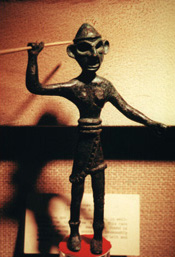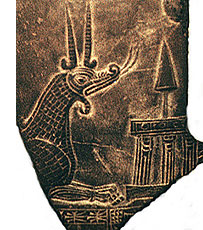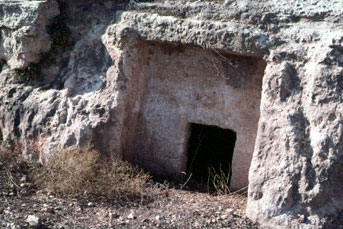Job 2-3
A Bible study with Jeffrey J. Harrison
Last time, we followed Job through the four horrible calamities that took away his wealth and his children. Yet in spite of these tragedies, he remained faithful to God and refused to speak out against his Maker.
A Second Divine Council
But then, just when it seemed things couldn’t possibly get worse in his life, they did.
Job 2:1: “And it was the day when the sons of Elohim came to stand before Yhwh [standing as in service or worship]. And the Adversary [Satan] also came among them to stand before Yhwh.”
This is another heavenly council meeting, in which the sons of God (the angels), including Satan, present themselves before the Lord. They stand as servants before their master, or as officials before a king, just as the priests later stood to serve in the Temple in Jerusalem.
We didn’t say much about this council back in chapter 1, in part because it’s such an unfamiliar idea to most Christians. But the fact that such a divine council took place from time to time was recognized by people all across the Middle East in ancient times.* It was the heavenly equivalent of the attendance by nobles at the court of a king, a regular occurrence in earthly kingdoms.
* See Isa. 14:13, which mentions the mount of assembly
in the far north, the traditional place of the divine council; see also Eze. 28:14,16 which mentions this same mountain of God.
Everyone also agreed that these heavenly council meetings were chaired by the divine King. But the others attending, whom Job calls the sons of Elohim,
were considered by most ancient peoples not just to be angels, but gods. This belief is mentioned in Psa. 89:5-7, when it refers to this same council:
“And the heavens confess the wonder of your deeds, Yhwh,
Yes, your faithfulness in an assembly of the holy ones.
For who in the cloud of stars compares to Yhwh?
Who resembles Yhwh among the sons of the gods [elim, plural of El]?
God is viewed with terror in a council of the holy ones,
Great and feared above all those surrounding him.”
This passage is often mistreated by translators that are nervous about the idea of angels being called gods in the Bible. But this is no different than the apostle Paul’s admission that some worship these so-called gods
(1 Cor. 8:5). Both passages are intended to teach the far greater superiority of the true God.
Another important detail is the word translated here the cloud of stars
(shakhaq in Hebrew, Psa. 89:6). Most translations use the word skies
or heaven,
though this is not the usual word for sky or heaven. The root meaning of shakhaq is cloud of dust,
though the context always points to something in the heavens above. Most likely, this dust cloud
refers to the cloud of stars in the sky: either specifically to what we call the Milky Way, or simply the stars in general, as they once appeared in all their glory in the night sky.

This is important because these angels or gods were understood to be connected with the stars and planets in ancient times, just as they still are in a watered-down form in modern astrology and ufology. This makes sense of the poetic parallel in Psa. 89:6, in which the council of the gods is compared to the appearance of the stars in the sky: a council over which the true God reigns supreme.
Unfortunately, though, as in any human council or government, there were divisions in this heavenly council. Some were attracted to the dark side,
setting themselves up as gods in their own right (Gal. 4:8)—a rebellion that by Job’s time had already long since been underway. But for many years God continued to honor these angelic positions of power (as it says in Rom. 11:29, for the gifts and the calling of God are irrevocable
). It was only through the ministry of Jesus that the rebels were finally disarmed and cast out of heaven (Luke 10:18, John 12:31, Col. 2:15, Rev. 12:9-11).*
* In their place, a new government has been established by God for these end times, in which Jesus reigns supreme; a government that advances against the old order every time the gospel is proclaimed (Eph. 1:10, 3:10, 6:12). Meanwhile, Satan is organizing his last stand on earth. For more on this topic, see our Revelation of Jesus Christ to John Seminar.
Surprisingly, the various pagan peoples of the world agreed with Israel that there had been sedition in the ranks of the gods. The story usually went that a younger god, whichever happened to be favored by that particular nation, had risen up to replace the old high God as the king of the gods. After that, they relegated the old high God to a position of obscurity, or even of mockery. This basic storyline can be traced through many ancient cultures around the world.
Israel alone claimed that the old high God was still king, and that he is the only true God. Israel also identified the mastermind of the heavenly rebellion as Satan, a fallen angel, the enemy of the human race. Because of Satan’s rebellion, the world was brought into spiritual darkness, despite the fact that God has never ceased to reign as King.
This time when the council gathers, Satan entices God to allow him to attack Job’s person.
Job’s Disease
2:2: “And Yhwh said to the Adversary [Satan], ‘From where do you* come?’ And the Adversary [Satan] answered Yhwh and said, ‘From roaming around on the earth and walking back and forth on it.’”
Satan, as the prosecuting attorney of heaven, spent his time searching the earth for someone to accuse before God (1 Pet. 5:8).
2:3: “And Yhwh said to the Adversary [Satan], ‘Have you* set your* heart on my servant Job? For there is none like him on the earth, a man blameless and upright, fearing Elohim and turning away from evil, and still he holds on to his integrity, even though you* incited me against him in vain.’
2:4: And the Adversary [Satan] answered Yhwh and said, ‘Skin for skin, and all that a man has he will give for his soul [that is, his life].
2:5: However, send forth now your* hand and touch [or strike] his bone and his flesh and see if he will not bless
[that is, curse] you to your* face.’”
Satan challenges God with the words: Skin for skin!
(Job 2:4). Does that sound familiar? It’s like the expressions an eye for an eye
and a tooth for a tooth
in Exodus 21:24. Satan asks God to strike Job with a deadly disease, convinced that this will cause him to curse God.
2:6: “And Yhwh said to the Adversary [Satan], ‘Look, he is in your* hand; however you* will preserve his soul [that is, you may not kill him].’
2:7: And the Adversary [Satan] went out from the presence of Yhwh and struck Job with a terrible skin inflammation from the sole of his foot to the crown of his head.”
The affliction that Satan strikes Job with is often translated painful boils
(Job 2:7). But in Hebrew, it’s a singular word (shekhin) that should be translated more generally as an inflammation.
The association with boils probably comes from the use of this same word in Exodus to describe one of the plagues against Egypt. There this inflammation is described as “breaking out in boils [or blisters]” (Exo. 9:9). But elsewhere shekhin is associated with leprosy
in the general Biblical sense of that word as a bad skin disease: it’s the same Hebrew word used in the discussion of leprosy in Lev. 13:18-20 and 23. Leprosy at the time was especially associated with the judgment of God. So not only is Job made ill, he is struck from head to foot with the disease most directly associated with God’s displeasure.
2:8: “And he took a potsherd [that is, a piece of broken pottery] to scrape himself with it, and he was sitting in the middle of the ashes.”

What a horrible experience! There is Job, famous, upright Job, sitting among the ashes, scraping his disfigured skin with a broken piece of pottery. Both the ashes and the broken pottery identify this as the garbage dump of the village. In these dumps, as in many parts of the world today, refuse was constantly being burned, resulting in all the ash. In Jerusalem, because of the continual burning and all the refuse, the main garbage dump in the Gehinnom valley was used by Jesus and the rabbis as an image of eternal punishment (Gehenna in the original language of Matt. 5:22, 29-30, etc.). Lepers tended to congregate in these dumps, as with the poor in many countries today, hoping to find some sliver of food to keep themselves alive. They were not allowed to enter the city or village because of the fear of infection, in a day when antibiotics were unavailable. So the message to us is that Job, a leper, is now living the hellish existence of an outcast, separated by his disease from all normal human life.
2:9: “And his wife said to him, ‘Still you are holding on to your* integrity! Bless
[that is, curse] Elohim and die.’”
Even Job’s wife, the closest person left to him on earth, tells him to Curse God and die!,
in other words, that it would be better to die and get it over with than to go on like this. If you remember, this is exactly what Satan is trying to get Job to do: to curse God (2:5). Job’s wife repeats the words of Satan to him much as Eve did to Adam in the Garden of Eden (Gen. 3:17). So even Job’s wife became part of the Satanic attack against him in his time of trouble.
2:10: “And he said to her, ‘You speak as one of the foolish women speak! Besides, should we receive the good from Elohim, and not receive the bad?’ In all this, Job did not sin with his lips.”
Unlike Adam, Job resists the temptation presented by his wife. He says we must be willing to accept both good and adversity from God. Unlike many popular teachings today, Job doesn’t say we should wish away our troubles, or live in spiritual-sounding denial. Yes, the Bible teaches that we should pray with faith, believing God to answer our prayers. But what if God doesn’t answer our prayers—or not yet? What if he says no? Ultimately, the Bible teaches, everything in our lives comes from God, the good and the bad—or at least comes with God’s permission. And all of it comes with a purpose. Yes, God is a God of miracles and blessing. But he is also a shepherd. And sometimes the sheep need to be led through difficult places in order to reach the goal. Sometimes the vine needs to be pruned to reach its maximum yield.
Job says that we must not reject the difficult times of life any more than we do the blessed and happy times of life. God uses both to his glory. As the apostle Paul said, “I have learned to be content in whatever situation I am in. I know how to be humbled [or live humbly], and I also know how to abound [or live in abundance]. In anything and in all things I have learned the secret of being satisfied and being hungry, both of having abundance and being in need” (Phil. 4:11b-12). The good news is that God never asks us to go through these difficult times alone, but is there with us every step of the way.
Job’s Friends
2:11: And three of Job’s friends heard about all this evil that had come on him, and they came, each from his place, Eliphaz the Temanite and Bildad the Shukhite and Tzophar the Naamathite. And they gathered together to go to lament for him and to comfort him.
Eventually, word of Job’s tragedies reaches his three friends who come to see him. Each comes from quite a distance, from areas in the desert off to the east of Israel. Eliphaz comes from Teman, a village in what later became Edom, in modern-day Jordan. Bildad comes from Shuakh, off to the east somewhere. And Tzophar comes from Naamah, in northwest Saudi Arabia. These areas, at the edge of the desert, were associated by later Israelites with wisdom: Is wisdom no longer in Teman?
as Jeremiah put it (Jer. 49:7). So these distinguished tribal leaders should be seen not just as individuals, but as representatives of the collective wisdom and vast oral tradition of the sons of the east.
They, like Job, as we will soon see, speak in the flowery, poetic style that was immensely popular in this part of the world for thousands of years.
2:12: “And they lifted up their eyes from a distance and they did not recognize him, and they lifted up their voice and wept. And they tore, each of them, his robe, and they tossed dust over their heads toward the heavens.”

Notice that they first looked at Job from a distance.
Because of Job’s physical condition, they didn’t dare come too close. And as it turned out, his skin was so disfigured that they couldn’t even recognize him. The actions that followed—weeping, tearing their robes, throwing dust in the air—are all signs of mourning associated with death. It’s as if their good friend Job has died.
2:13: And they sat with him on the ground seven days and seven nights, and no one spoke a word to him, for they saw that his pain was very great.
Here’s another ancient custom associated with mourning: sitting for seven days. In modern Jewish society, this sitting sheva,
as it’s called (sheva means seven in Hebrew), is still observed after the death of a close relative. The mourners avoid sitting on soft cushions and many other actions associated with ease and comfort. The friends and family that come to visit simply sit with them as a way to show their concern and share their loss. A minimum of words is still today considered proper behavior.
Job’s First Speech
3:1: “After this, Job opened his mouth and cursed his day [the day of his birth].”
Finally, after a week together, Job begins to speak. He still avoids cursing God. But instead, he curses his day,
which as we saw earlier refers to the day of his birth.
3:2: “And Job answered and said,
3:3: ‘May the day perish in which I was born, and the night he said, “A male has been conceived.”
3:4: May that day be darkness; may Eloah above not care for it, and may no light shine on it.’”
May the day of his birth be ignored by God, he says, and have all light cut off from it. Eloah is the singular form of the much more common plural word for God: Elohim.
3:5: “‘May darkness and the shadow of death redeem it, may a cloud dwell on it, may the blacknesses of a day terrify it.’”
Redemption is a word we ordinarily associate with something good. It’s a word that originally referred to a close kinsman that comes to rescue you from a serious problem. That’s why it’s such a powerful word in the story of Christian salvation: that God himself comes as a close kinsman to rescue us from sin. But in this case, Job is wishing that the ones doing the redemption of his day
would be darkness and the shadow of death: in other words, that his birthday would be claimed by darkness and death as one of their own, and that it would become like them.

What about the last phrase in that verse, “Let the blacknesses [plural] of a day terrify it.” What are the blacknesses that take place in the daytime? This may be a poetic reference to solar eclipses, when the earth becomes suddenly black as night in the middle of the daytime, an event that was terrifying to people in ancient times. Job is wishing that the day of his birth would be blackened with the darkness of an eclipse.
3:6: “‘That night, may gloom take it, may it not rejoice in the days of the year, may it not come up in the number of the months.’”
Now Job turns to the night
of his conception (see 3:3b), asking that it be left completely out of the calendar.
3:7: “‘Look, may that night be barren; may no joyful shout come in it.’”
In other words, may no conception have taken place on that night.
3:8: “‘Let those who curse a day curse it, those who are ready to rouse Leviathan.’”

Those who curse a day
refers to enchanters that might try to weave a spell of evil over a day.
Leviathan,
in the second half of the verse, refers to an enormous sea-going creature described in great detail later in Job 41, and mentioned in a few places in the Bible. This creature is similar to the ancient plesiosaur identified by fossil hunters, or perhaps a mosasaur. This brief note in Job is fascinating because it assumes common knowledge of the dangerous nature of this creature. But how could people in Job’s day be familiar with the temperment of a creature that modern science says went extinct millions of years ago? Perhaps it didn’t die out so long ago after all. (For more information on this fascinating topic, see our teaching on Dinosaurs in the Bible.)
In this verse, those who are ready to rouse Leviathan
—which is clearly not a good idea (see Job 41)—serves to further describe the enchanters of the first part of the verse. Since rousing Leviathan is clearly foolish, if not suicidal, this implies that being an enchanter is also extremely foolish. In this way, Job makes a negative comment about enchantment and witchcraft, even while wishing that the day of his birth was cursed.
3:9: Let the stars of its twilight be darkened; let it wait for light and there be nothing, and let it not see by the rays of dawn.
While wishing the opposite for the night of his conception, Job paints a beautiful picture of waiting for the light of dawn, an event made even more attractive in these desert areas by the blessed cool of the early morning air, and by the crystal-clear skies of the desert night. This is in dramatic contrast to the bright light and heat of the day. But Job wishes instead that even the most delightful part of that night—the first glimmer of daylight—would be without light of any kind.
3:10: “‘For it did not close the doors of my mother’s womb and hide trouble from my eyes.’”
Let that night be darkened, he says, since it did not prevent his conception, which has led to all this trouble.
3:11: Why did I not die from the womb, come out of the belly and expire?
Why, he asks, did I not die at birth; why was I not a stillborn child?
3:12: For what reason did the knees come to meet me, and why the breasts that I might suck?
Placing a child on his knees was the custom by which a father recognized a newborn child as his legitimate offspring and it became an official part of the family (Gen. 30:3, 50:23). But what was the purpose of all that, Job says, given the disaster his life has become?
Job Longs for Death
3:13: For now, had I lain down and been quiet, had I slept then, there would be rest for me
If he had died at birth, Job says, he would now be experiencing the restful condition of death. The association of sleep and death was direct in the ancient Middle East. Tombs were carved from the rock with places to lay the dead that resembled and were ornamented like beds. The two ideas were so closely allied that even in the time of Jesus, it could be confusing whether sleep
meant ordinary sleep or the sleep of death (John 11:13).
3:14: With kings and counsellors of the earth, who built ruins for themselves,

Here, in death, Job would be with even the greatest of those who had passed on before. Though the idea that they built ruins
has confused some translators, the idea is that, from the perspective of history, all that these important
people of the past were able to accomplish now sits as a heap of ruins. This is a view that comes naturally to anyone who wanders this land strewn with so many ruins you can barely walk anywhere without crunching ancient pottery underfoot.
3:15: “‘Or with princes, for whom there was gold, who filled their houses with silver.
3:16: Or like a hidden miscarriage, I would not be; like infants that have not seen light.
3:17: There the wicked have ceased raging, and there rest those weary of power.
3:18: Prisoners together are at ease; they do not hear the voice of the task-master.
3:19: Small and great are there, and a servant is free from his lord.’”
In death, prisoners and slaves are free from their labors. All are equal, the small and the great.
3:20: Why does he give light to the one who suffers, and life to the bitter of soul,
Why, Job asks, does God give life at all to those who are destined to suffer? The two phrases in this verse, which have a similar meaning, are synonymous parallels. This puts light
in parallel with life,
just as in John 1:4: “By [or in] him [Jesus] was life, and the life was the light of men.”
3:21: “‘Those who long for death and there is none, and dig for it more than for hidden treasures,
3:22: Who are glad to the point of rejoicing—they are jubilant—when they find a tomb,’”
This is a picture of true misery: people searching and longing for death as if they were exploring for hidden treasure. And when do they rejoice? When they find a tomb they can lay themselves in. A similar image appears in Rev. 9:6: And in those days, people will seek Death and will certainly not find him, and they will long to die and yet Death flees from them.
3:23: To a man whose way is hidden, and whom Eloah has covered over?
Why is light (or life) given, Job asks (referring back to vs. 20*), to a man whose way is hidden from God and his care, whom God has intentionally covered over or hidden so as not to see him and help him. Here we begin to get a clearer picture of Job’s feelings about his situation: that God has hidden him away and forgotten about him. What good is it to have the light of life, Job asks, if it is covered over in darkness, away from the care of God? What good is it to be alive if suffering and misery are all that life brings?
* Vss. 20-23 are a chiasm: A, B, B', A'.
3:24: For faced with my food, my sighing comes, and my groanings pour out like water.
His condition is so bad, Job says, that the sight of food makes him groan. Even eating has become painful for him.
Job’s True Motive in Religion
3:25: For the terror I feared happens to me, and what I dreaded comes to me
Here Job reveals his true motive for serving God and offering all those sacrifices: to prevent bad things from happening to him (Job 1:5). This is the underlying motive for much of practical religion around the world: to avoid problems and have a good life. But all that religious activity didn’t stop horrible things from happening to Job.
3:26: I was not at ease, and I was not undisturbed, and I was not at rest, and trouble came.
All Job’s religion didn’t bring him peace, and it didn’t help him avoid trouble. This is why Job wishes he had never been born: because he doesn’t see any way out of his predicament. He has tried serving God as a way to avoid trouble, and it didn’t work. So now he doesn’t see any other possible course of action. So he despairs of life itself.
Instead of the peace and prosperity he longed for, Job’s religion has brought him into a death-to-self experience. This is not what most of us want—in fact, it’s just the opposite of what most of us want. But it’s the very nature and essence of true religion as Jesus taught it: Whoever does not take his cross and follow after me is not worthy of me
(Matt. 10:38). Or again, “The one who has found his soul [or self] will destroy it, and the one who has destroyed his soul [or self] because of me will find it” (Matt. 10:39). Dying to self is an uncomfortable experience. But rather than being the path of destruction we all imagine it to be, Jesus says that this is the only path to life: “How narrow the gate and difficult [literally, distressed or afflicted] the way that leads to life; and few are those who find it” (Matt. 7:14). Job is right where God wants him to be, as are we all in our times of affliction.
* indicates a second person singular (you singular).
# indicates a second person plural (you plural).
Yhwh is the personal name of the God of Israel, sometimes vocalized Yahweh
and usually translated the Lord
in English Bibles. See the index category Yahweh for more information about the name of God.

